 W
WAlpheus heterochaelis, the bigclaw snapping shrimp, is a snapper or pistol shrimp in the family Alpheidae. It is found in the western Atlantic Ocean and the Gulf of Mexico.
 W
WAnilocra capensis is a species of parasitic isopod in the family Cymothoidae. It is endemic to southern Africa. The species preferentially attaches itself to the hottentot.
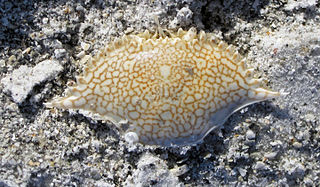 W
WArenaeus cribrarius, the speckled swimming crab, is a species of swimming crab in the family Portunidae.
 W
WCallichirus major sensu lato is a monophyletic species complex of ghost shrimp in the infraorder Axiidea, found in flat sandy beaches across the Pan-American coastline.
 W
WCaprella equilibra is a species of skeleton shrimp in the family Caprellidae. It lives among other organisms on the seabed and occurs in both shallow and deep water in many parts of the world.
 W
WThe sand isopod, Chiridotea coeca, is a species of isopod crustacean found in the western Atlantic Ocean, from Nova Scotia to Florida.
 W
WCirolana cranchii is a species of isopod crustacean.
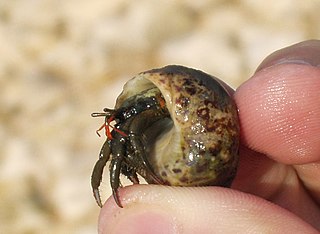 W
WClibanarius erythropus is a species of hermit crab that lives in rockpools and sublittoral waters. It is found in the Mediterranean Sea, Black Sea and eastern Atlantic Ocean from the Azores to Brittany, the Channel Islands and as far north as the south Cornwall coast. Individuals may grow up to a carapace length of 15 millimetres (0.6 in).
 W
WThe Tasmanian giant crab, Pseudocarcinus gigas is a very large species of crab that resides on rocky and muddy bottoms in the oceans off Southern Australia. It is the only species in the genus Pseudocarcinus.
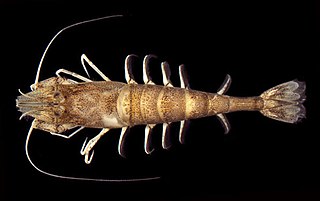 W
WCrangon septemspinosa is a species of shrimp, one of several known as the sand shrimp. It lives along the Atlantic coast of North America, from Newfoundland to Florida, at depths to 450 m (1,480 ft).
 W
WThe Florida stone crab is a crab found in the western North Atlantic, from Connecticut to Belize, including Texas, the Gulf of Mexico, Cuba, The Bahamas, and the East Coast of the United States. The crab can also be found in and around the salt marshes of South Carolina and Georgia. It is widely caught for food. The closely related species Menippe adina is sometimes considered a subspecies – they can interbreed, forming hybrids – and they are treated as one species for commercial fishing, with their ranges partly overlapping. The two species are believed to have diverged approximately 3 million years ago.
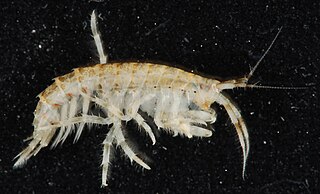 W
WGammarus mucronatus is a species of scud in the family Gammaridae. It is found in the coasts of the North American Atlantic seaboard and the Gulf of Mexico.
 W
WThe hairy stone crab is a crab-like crustacean that lives in the littoral zone of southern Australia from Bunbury, Western Australia, to the Bass Strait. It is the only species in its family. It is 1.5–2.5 cm (0.6–1.0 in) wide, slow-moving, and covered in brown hair which camouflages it against the rocks upon which it lives.
 W
WMithraculus sculptus, the green clinging crab or emerald crab, is a species of crab in the family Majidae. It is a dark green colour and is found in tropical waters in the Caribbean Sea. It is sometimes kept in reef aquaria.
 W
WMithrax spinosissimus, also known as the West Indian spider crab, channel clinging crab, reef or spiny spider crab, or coral crab, is a species of spider crab that occurs throughout South Florida and across the Caribbean Islands. The diet of this crab is largely unknown; however, it is considered a large omnivore, reaching size up to 2 kg, which has been noted to feed on algae and carrion. Unlike crabs such as the blue crab, the West Indian spider crab is not commercially harvested for its meat, though it is said to be delicious.
 W
WOcypode cordimanus is a species of crab in the family Ocypodidae, sometimes called the smooth-handed ghost crab. It is widely distributed in the Indian Ocean and Pacific Ocean.
 W
WPorcellio spinicornis is a species of woodlouse in the genus Porcellio belonging to the family Porcellionidae. This species is widespread in Europe, and has also been introduced to North America. It has wide spiny frontal lateral lobes.
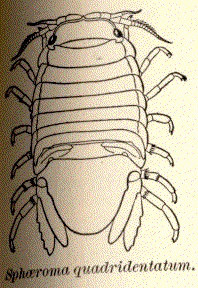 W
WSphaeroma quadridentatum, the sea pill bug, is a species of isopod in the family Sphaeromatidae.
 W
WSquilla empusa is a species of mantis shrimp found in coastal areas of the western Atlantic Ocean. It excavates and occupies a burrow in soft sediment from which it emerges, mainly at night, to feed on fish and invertebrate prey.